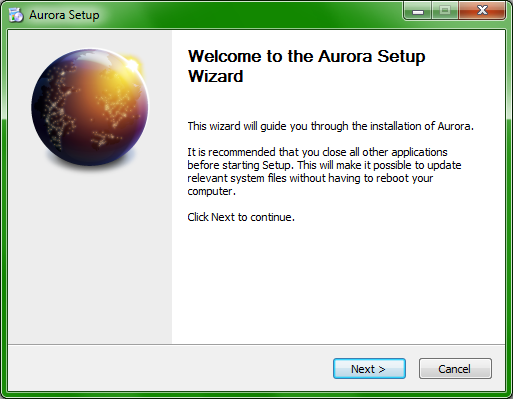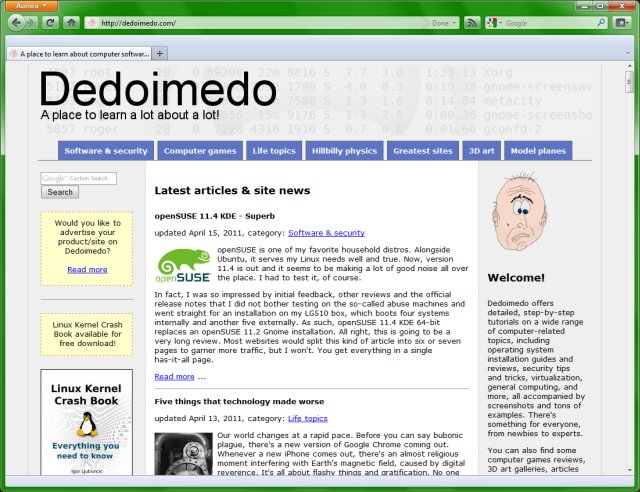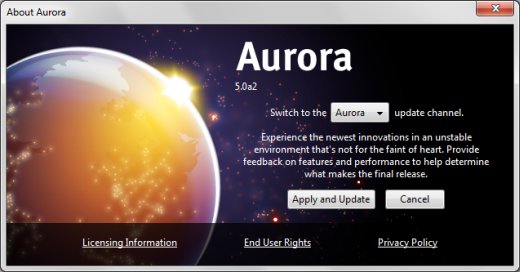Updated: May 10, 2011
The term the bleeding edge of technology takes a whole new meaning when you embrace young and fledging concepts or dabble in alpha-beta quality software. We already saw a prime example of this embodied in Fedora, a Linux distribution with inherent instability as a feature not a bug. Now, Firefox has its own dastardly version called Aurora.
This seems to be another spinoff of the peer pressure mentality sinking in the browser arena. Tabs on top was the first phenomenon. An ultra rapid release cycle is the second. A dedicated development/testing browser version is the third. Chrome has one, which means it was only the matter of time before the competition broke and produced their own ideas. Microsoft did this with Internet Explorer 10 Preview. Mozilla launched Aurora.
What is Aurora?
Apart from what I've written above, obviously, Aurora is a compromise between nightly builds and official beta releases. The concept of early testing is nothing new, however Aurora gives unofficial technology an official name. It is a browser good enough for geeks and testers to satisfy the media demand for a development version that equals the Chrome practice. Whether you agree or disagree is irrelevant here; we will have a separate talk on that elsewhere. Now, we focus on the actual stuff.

Note: Image taken from The Mozilla Blog.
So why would you want Aurora? Well, if Firefox release cycle is going to speed up, then you might want to get ready in advance. Early testing will help you determine what operational changes you may require in your setup come the official beta. Besides, if you're really keen on software testing, you've just earned another fabulous playtoy. Just be careful, that's all.
Testing Aurora
Aurora can be installed separately from your resident Firefox. In fact, it is most recommended that you use a separate installation AND a different profile, as things might go wrong. Testing unstable software has its price; you have to be disciplined and stick to a strict regime of separation and isolation. Most of the time, Firefox early releases are fairly robust, but there could always be surprises.


At the moment this article was written, Aurora, at increment 5.0a2 is identical to the official Firefox 4 release. I could not find any cosmetic or technical changes. For the time being, the current version is a placeholder for future work.
Like Internet Explorer 10, the focus will be on HTML and CSS technologies, but we ought to see even better tab management, cloud widgets, security features, and multi-session sharing experience across different computers.
Essential extensions
When working with pre-releases, lots of things are going to break. You may want to consider using some of the development-dedicated extensions, like Firebug, Nightly Tester Builders or Mr Tech Toolkit. Please visit addons.mozilla.org for more details.
You can also manually override checks, in about:config:
extensions.checkCompatibility.5.0a;false
Check for updates & update channel
And you should always check for updates, too. There ought to be quite a few, often, especially if Mozilla accelerates its release schedules, as planned. Now, the good part is that once there's an update available, it will be automatically downloaded and applied, so you will always be at the forefront of development. Moreover, whenever you feel like slowing down a little, you can switch the update policy and change channels to either the official or beta release. This is a very interesting and unique thing, overall.



More reading
A whole bunch of articles on Firefox 4:
Firefox 4 Preview - Foxy, sharp and fast!
Taming Firefox 4 - The annoyance-less guide
A word about the competition:
Internet Explorer 9 Beta, Final and comparison.
Conclusion
Whether Aurora is a pointer in the right direction, only time will tell. It could turn out to be a useless gimmick, a copycat feature with no purpose at all. On the other hand, it could become a powerful tool for developers and web designers. Increased exposure should guarantee fewer surprises, better compatibility and smoother transitions to new versions. This is particularly important for Firefox addon developers, who now must adapt to the new quick release cycle.
Media hypes aside, I do believe Aurora has its place in the software testing tier. It's a nice compromise between wider-use betas and wild nightlies, allowing more people to conduct checks and look for bugs without getting scarred by the experience. Overall, in the long run, such practice will draw in more people toward Firefox, or at the very least, make major releases easier and less painful, which is always a good thing.
Aurora will always be a geek tool, but one with good potential of breeding a new generation of Firefox hardcore fans, obsessed with the thrill of living on the edge, the bleeding edge, where heroes are made or broken. Or at the very least, software is tested.
Enjoy your new toy. Don't forget to backup.
Cheers.